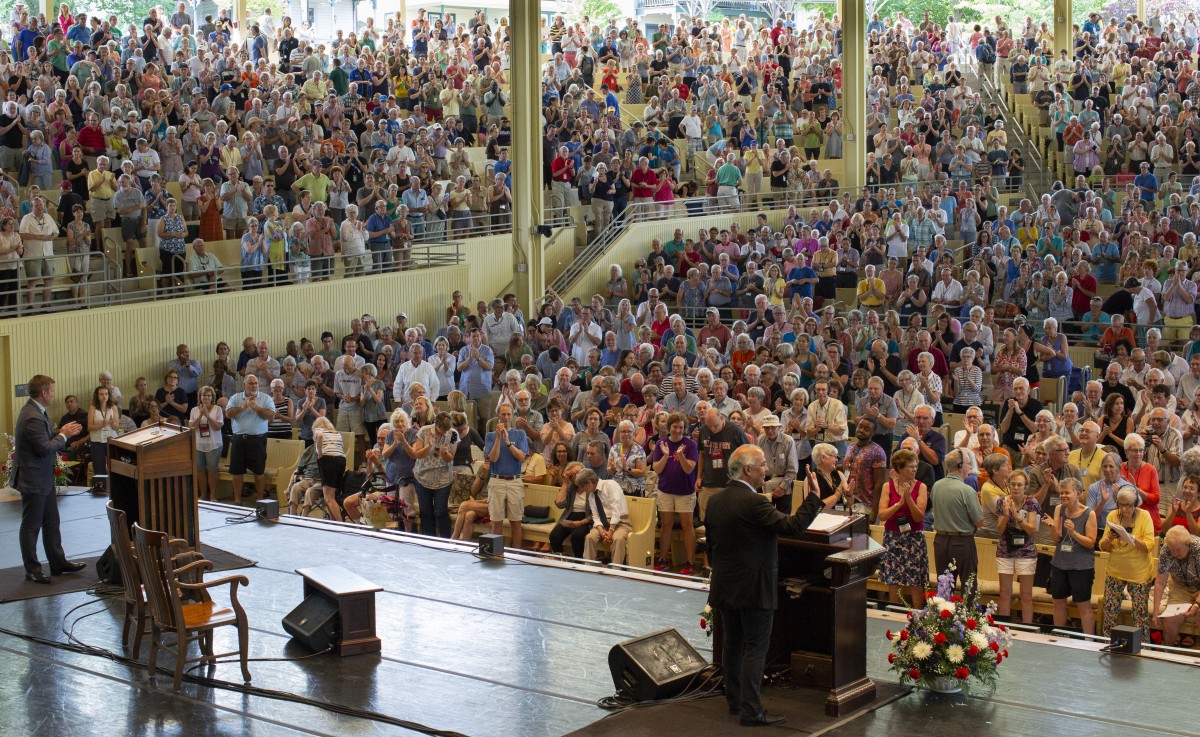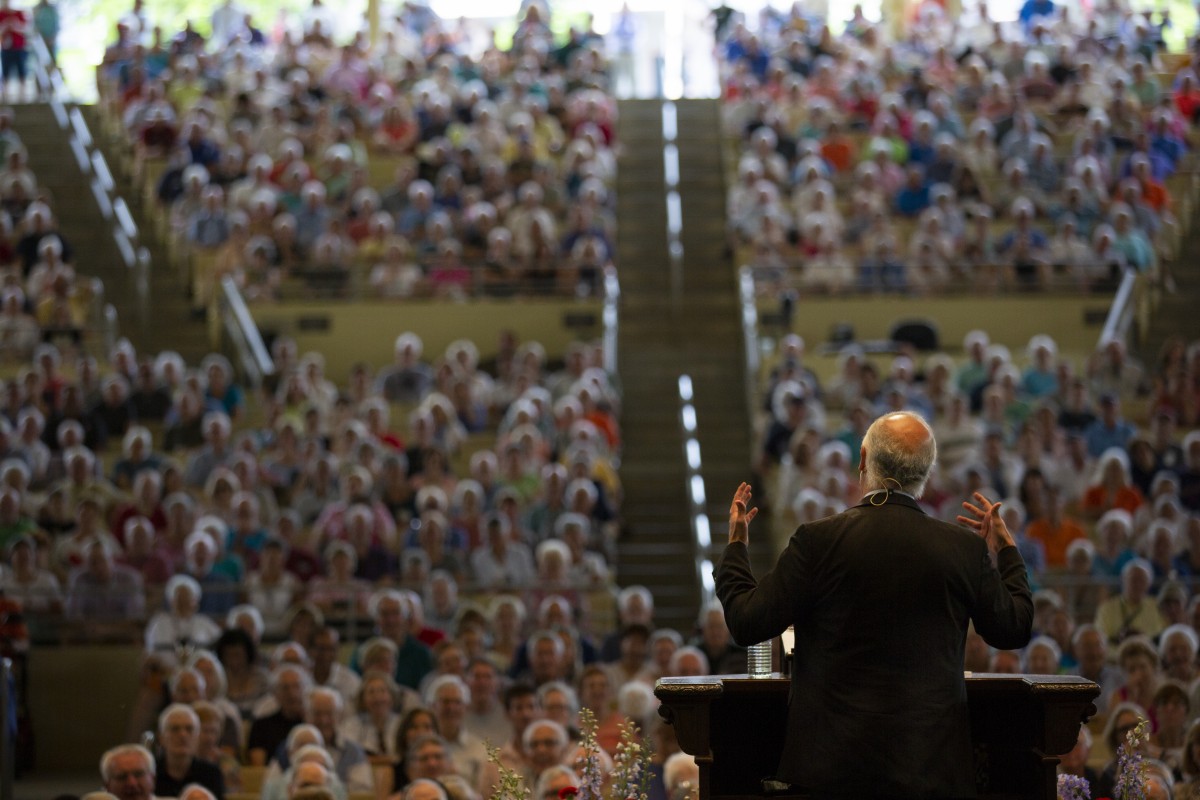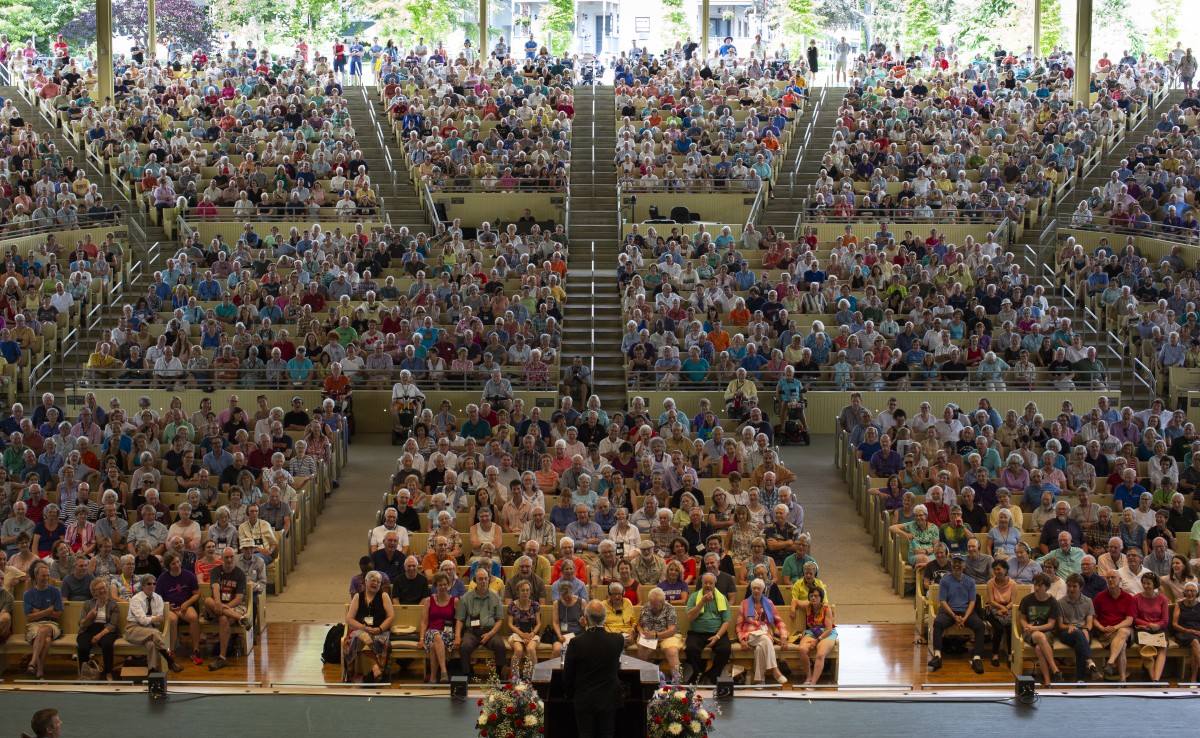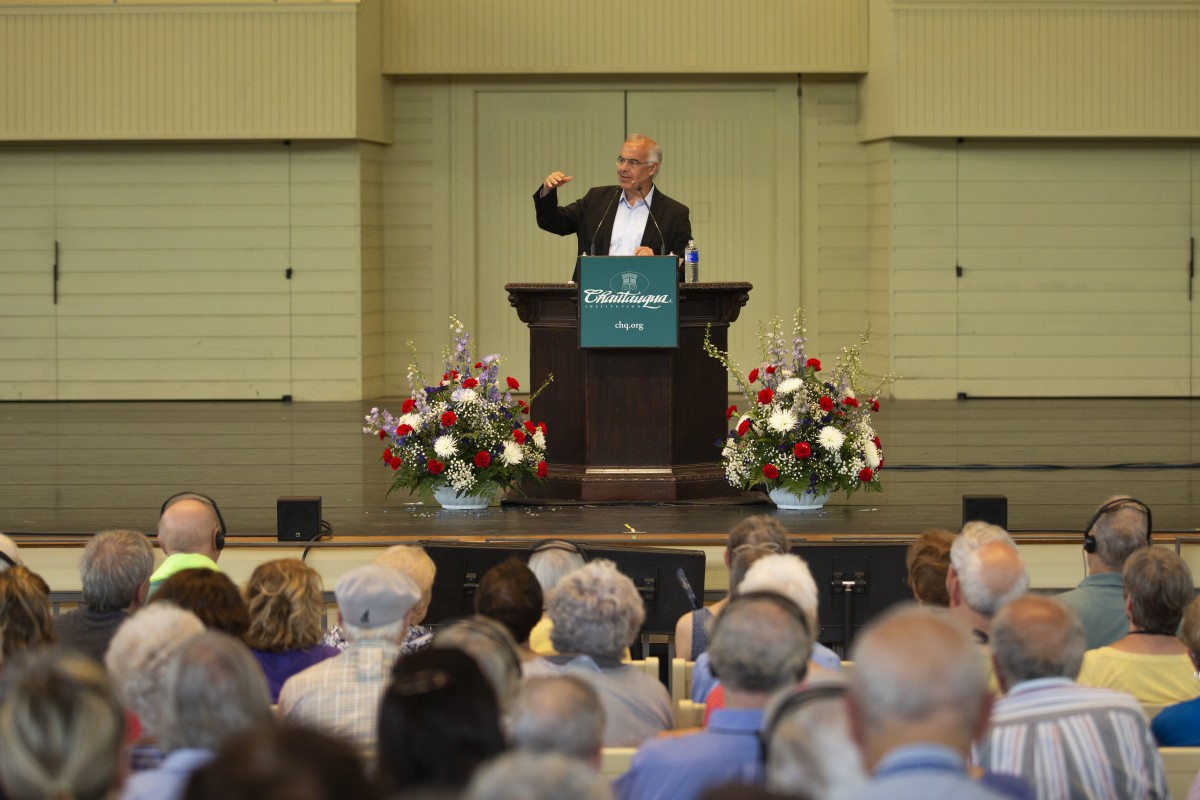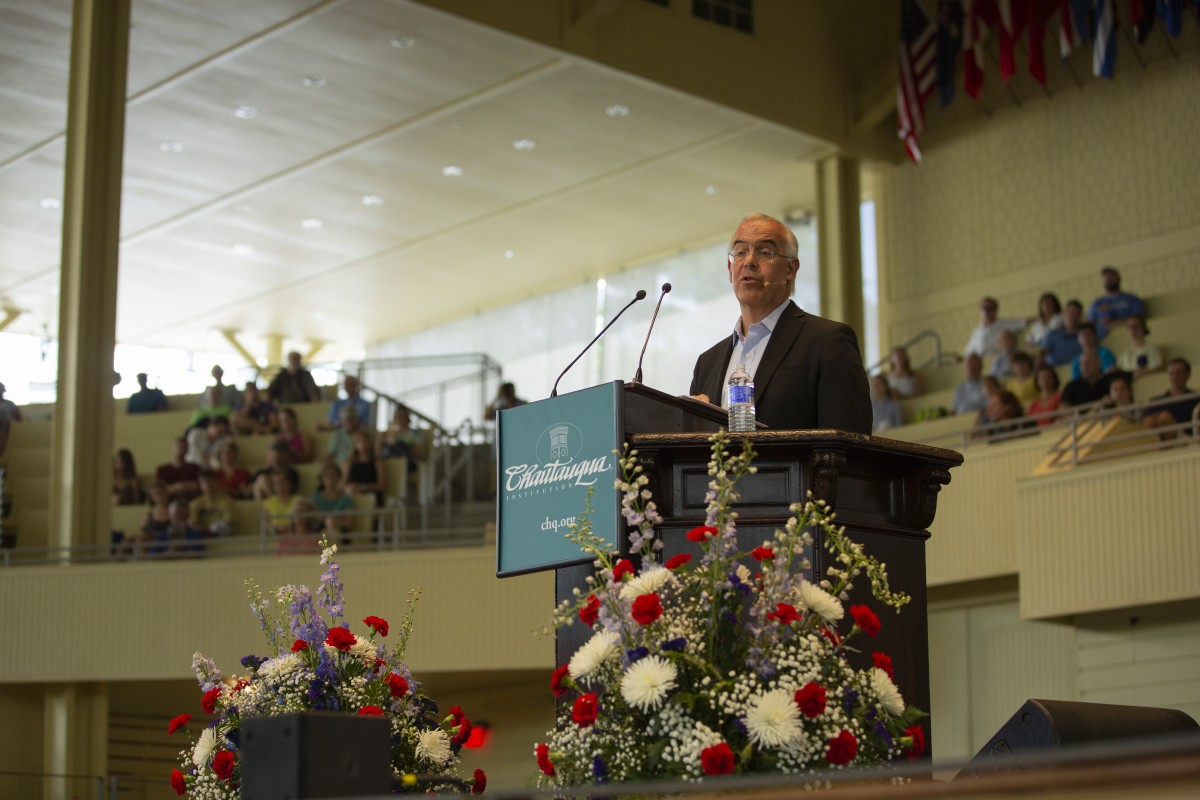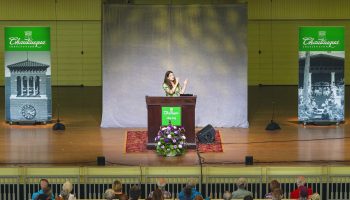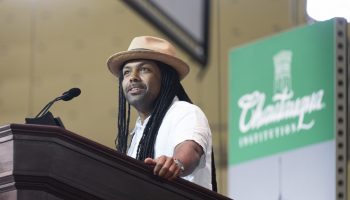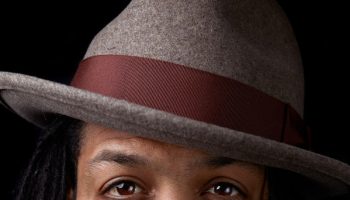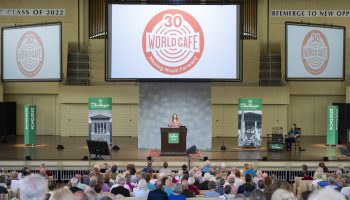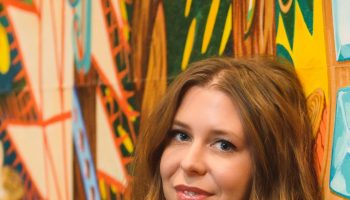For David Brooks, rekindling love and community is at the heart of American identity.
“We are driven by this heart and soul to bond with each other,” Brooks said. “It’s our natural inclination. So you have to believe that our nation will prevail and that even in a moment of isolation and loneliness and division, we will find a way to bond through love and affection.”
The New York Times op-ed columnist spoke at the 10:45 a.m. morning lecture on Thursday, July 5 to an overflowing Amphitheater, tackling Week Two’s theme, “American Identity.”
Brooks described his life as “bookish.” His initial infatuation with writing began after he read Paddington the Bear. In high school, when a girl dumped him for someone else, he thought, “but I’m a much better writer than that guy.”
“And so we have different values,” he said over a roar of laughter (and a lone crying baby).
When he was 18, the admissions offices of Brown University, Wellesley College and Columbia University decided he should go to the University of Chicago, he said. There he found a “bookish place” for his “bookish life.”
From there, Brooks served as a senior editor at The Weekly Standard and a contributing editor at Newsweek and Atlantic Monthly. Brooks is a senior fellow at Yale University and a regular commentator on PBS’s “NewsHour.” In 2003, he became a “conservative columnist” at The New York Times, which he describes as “being the chief rabbi in Mecca.”
He is the author of Bobos In Paradise: The New Upper Class and How They Got There; On Paradise Drive: How We Live Now (And Always Have) in the Future Tense; The Social Animal: The Hidden Sources of Love, Character, and Achievement; and The Road to Character.
This was Brooks’ third appearance at Chautauqua Institution; he last visited five years ago — when he was 10 years younger, Brooks said.
Aside from his bookishness, Brooks values consciousness, which he said is comprised of two parts; the first is the heart.
Brooks talked about a friend who desperately tried to remove a bamboo stand. The man tried to cut down the plant, taking an axe to its roots; he dug a three-foot hole, poured chemicals and cement into the hole, but eventually the bamboo began to peak through the concoction. Brooks said that just like the bamboo, the heart will prevail.
“We all have something like that. We have some piece like that that is our desire and which pushes through anything. … We are always desiring,” Brooks said.
The second part of consciousness, according to Brooks, is the “yearning soul.”
Brooks asked, not that the audience believe in a god or higher power, but if they “believe that (they) have a piece of (them) that has no shape, color, size or weight; that is of infinite value and dignity; that (believes) slavery is wrong because it assaults another human being’s soul; that rape is wrong, not because it assaults a bunch of physical molecules; that it’s an assault on another human being’s soul; and that obscenity is anything that covers up another person’s soul. And what this soul does is it yearns for righteousness.”
But, Brooks said, society is attacking the joy of the heart and soul with its individualistic culture.
In our current climate, there is an emphasis on self, he said. Levels of narcissism are rising, the U.S. is “No. 1 in the world in thinking that we’re good at math,” he said; college men would choose fame over sex, according to Brooks.
There is also an institutional issue of alienation sweeping the nation, he said, with higher levels of social distrust, and a “crisis of meaning” with rising depression and suicide rates and the opioid epidemic — the “slow suicide,” he said.
Much of this Brooks contributed to the nation’s “tribal mentality.”
“It’s us versus them; it’s friend and enemy,” he said. “And the politics in tribal mentality is what we call in political science ‘the negative polarization.’ Do you like your own party? ‘Not really.’ Do you hate the other side? ‘Totally.’ So our politics are more driven on hatred.”
Brooks sees “tribal mentality” as a greater issue than just a riff between political ideologies — he sees it as a “silent Pearl Harbor,” if not as “dramatic.”
“When the foundations of democracy are being shredded, isn’t that a silent Pearl Harbor?” Brooks said. “When the foundations of capitalism, of free movement of goods and people are being shredded, seems to me like a silent Pearl Harbor. … When 55,000 people die of opioid addiction and 45,000 commit suicide, that seems a silent Pearl Harbor.
“So, we are not going to be asked as older generations have been asked, ‘What did you do in the war?’ I think we will be asked ‘What did we do in the peace?’ ”
Although the U.S. is not experiencing a spiritual revival or a political revival, it is experiencing a civic revival, Brooks said. Grassroots movements across the country are motivated by “the love of the good” and “the love of their (cities),” and are focused on building relationships with youth. He called those community groups “the answer to our nation’s problems.”
However, these groups are working at a micro level while the country is losing its narrative on a macro scale, he said.
Brooks grew up with the “immigrant mentality and the Exodus narrative” — the belief that waves of people came to the “promised land” like the story of Moses.
“The Puritans came with that narrative, the Founding Fathers came with that narrative. … Every subsequent immigrant came with that narrative, … and yet, we have to face the reality for a lot of young people that that narrative makes no sense to them,” Brooks said. “They just don’t buy that this is a promised land. … It’s a new narrative of commitment to each other based on redemption and forgiveness.”
After receiving a prolonged standing ovation, Brooks kicked off the Q-and-A.
“Now we can talk about Paul Manafort for 20 minutes,” he said.
President Michael E. Hill asked the first question: What are communities doing to foster these bonds?
For Brooks, politics are not the sole influence in life. When he goes to polarized areas like “blue” Vermont or “red” Louisiana, he said, there is a healthy foundation that doesn’t rely on politics. Brooks stressed listening to people of different opinions and ideologies to cultivate community growth.
Hill turned to the audience for questions — what politicians are building strong communities, one attendee asked. Brooks answered with John McCain, Ben Sasse, a Republican junior senator from Nebraska, and Amy Klobuchar, a Democratic senator from Minnesota.
“I would say politicians are not that callous; they wouldn’t do it if they didn’t love their country,” he said. “It’s just they’re just stuck in a rotten system that makes them behave the way they behave.”

